Search
Remove Ads
Advertisement
Summary 
Loading AI-generated summary based on World History Encyclopedia articles ...
Search Results
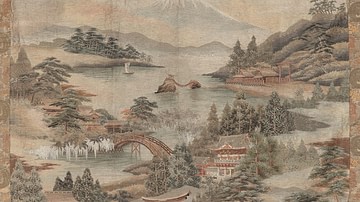
Definition
Meiji Period
The Meiji period refers to the period in Japanese history from 1868 to 1912 during which the Meiji Emperor reigned. Following the overthrow of the Tokugawa shogunate in the Meiji Restoration of 1868, Japan's new leaders embarked on a program...
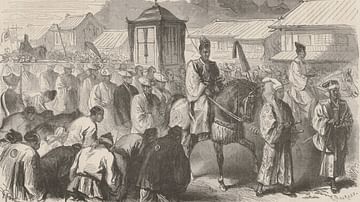
Definition
Meiji Restoration
The Meiji Restoration was a political event that took place in Japan in 1868. In it, the Tokugawa family, a warrior clan that had ruled Japan for more than 260 years, was overthrown by a group of political activists who proclaimed that their...

Image
Emperor Meiji Moving from Kyoto to Tokyo
The palanquin and procession of Emperor Meiji moving from Kyoto to Tokyo through the Tokaido road. Drawing published on the 20 February 1869 issue of Le Monde Illustré, after a croquis by Alfred Roussin, French navy officer in Japan. National...
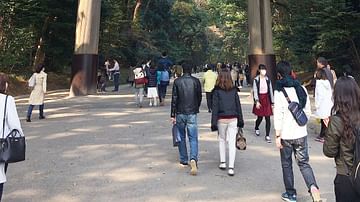
Image
Torii Gate at Meiji Jingu Shrine in Tokyo
This is one of two entrances to the Meiji Jingu Shrine in Tokyo, Japan, which are marked by large wooden torii gates. At Shinto shrines in Japan, the torii demarcates the dividing line between profane and sacred spaces. At the Meiji Jingu...
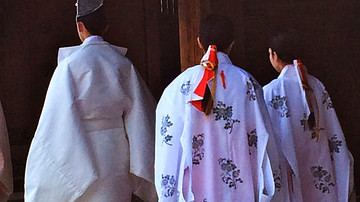
Image
Shinto Priest and Female Shrine Stewards at Meiji Shrine
In this picture, one sees a male Shinto priest accompanied by two female shrine stewards (or "miko" in Japanese) at the Meiji Shrine in Tokyo, Japan as they prepare to oversee a wedding ceremony. While there are some female Shinto priests...
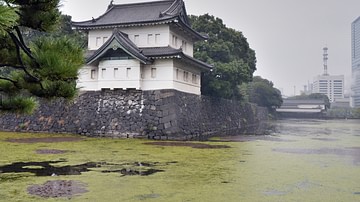
Definition
Edo Period
The Edo period refers to the years from 1603 until 1868 when the Tokugawa family ruled Japan. The era is named after the city of Edo, modern-day Tokyo, where the Tokugawa shogunate had its government. It is also sometimes referred to as the...
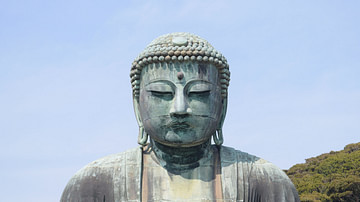
Definition
Kamakura Period
The Kamakura Period or Kamakura Jidai (1185-1333 CE) of medieval Japan began when Minamoto no Yoritomo (1147-1199 CE) defeated the Taira clan at the Battle of Dannoura in 1185 CE. The period is named after Kamakura, a coastal town 48 kilometres...
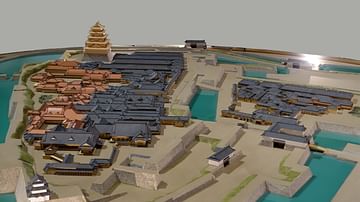
Definition
Edo Castle
Edo Castle was a large castle built by the Tokugawa family in 17th-century Japan. It served as their seat of government for more than 260 years. After the Meiji Restoration of 1868, Edo became the capital of Japan and was renamed Tokyo. Edo...
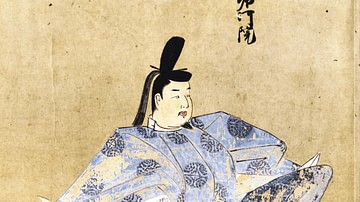
Definition
Emperor of Japan
The emperor of Japan is a position as the head of state which traditionally dates back to the 7th century BCE and the legendary figure of Emperor Jimmu (r. 660-585 BCE). Emperors came to be known as the Tenno or 'heavenly sovereign' in reference...
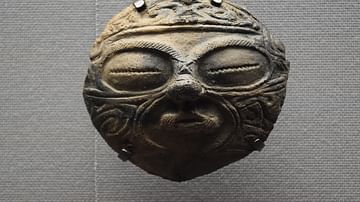
Definition
Jomon Period
The Jomon Period is the earliest historical era of Japanese history which began around 14500 BCE, coinciding with the Neolithic Period in Europe and Asia, and ended around 300 BCE when the Yayoi Period began. The name Jomon, meaning 'cord...